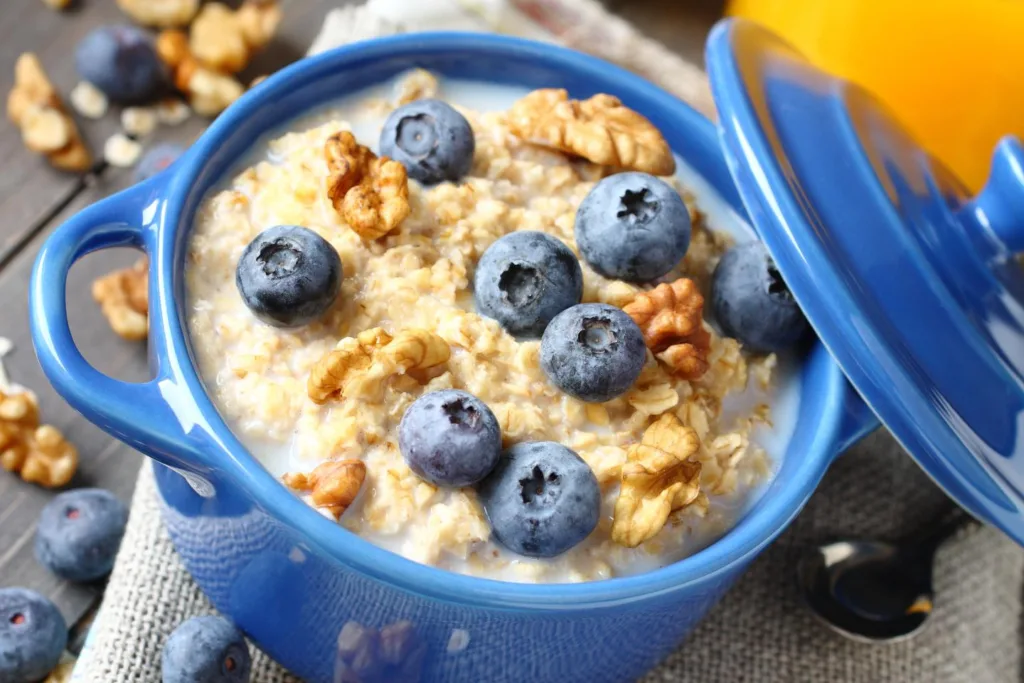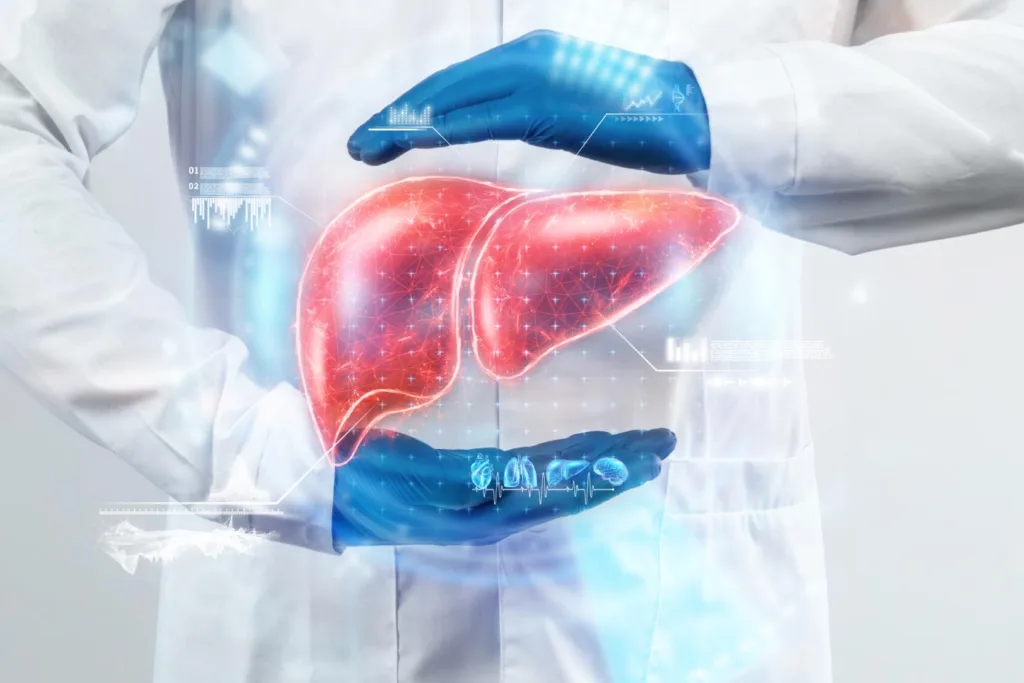Table of Contents
Have you heard of the trend in the health and fitness world — the “lemon coffee” for weight loss? It’s a tempting idea to sip on a slimming tonic and watch the pounds melt away, but do these claims hold any truth? In this article, we’ll dive deep into the science behind the trend to separate fact from fiction.
We’ll also explore the potential benefits of coffee and lemon juice for weight loss and whether other trendy “weight-loss elixirs” — enzyme coffee and probiotic coffee — fit into the equation. So, grab a cup of your favorite coffee, and let’s get started!
Is coffee good for weight loss? The science behind
Coffee has long been on the radar for its potential to be a healthful addition to your weight-loss diet, thanks to its ability to regulate appetite and rev up your metabolism (1).
In fact, caffeine, the major compound in calorie-free coffee, can support maintaining your weight and body fat through thermogenesis (heat you up), fat burn, and lower energy intake (2, 3).
Caffeine works by increasing certain dopamine receptors in your brain, which can increase alertness and arousal. They also block adenosine receptors which can result in increased wakefulness and other stimulating effects on the body. That’s why drinking coffee boosts your awakeness and energy (4, 5).
Caffeine may also stimulate the sympathetic nervous system, which can help reduce hunger and increase satiety (2).
Drinking coffee may also ramp up our basal metabolism rate (energy our cells burn to keep your basic body functions going) and help our body process sugar better (6, 7).
This evidence seems encouraging, but to reap the weight-loss benefits, you would need to drink caffeine in large quantities — one study estimated the amount at four cups a day — and that would lose 4% of your fat mass in 6 months (8).
Plus, this effect would be momentary, as your body would quickly become tolerant to caffeine (9, 10). There is just some small-scale evidence to truly support coffee for weight loss.
What’s more, the type of coffee really matters. Black coffee is actually the best for weight loss, but you certainly won’t benefit from adding cream and sugar.
Coffee is potentially a weight loss aid due to its ability to regulate your appetite and kickstart your metabolism through signals induced by caffeine. However, large quantities of black coffee would be required to achieve meaningful weight loss.
Best time to drink coffee for weight loss — The secrets
Caffeine is technically a stimulant or a drug. Also, coffee is not the only source of caffeine: it is included in soda, tea, energy drinks or bars, and even chocolate (11). Knowing the best time to consume coffee can protect you from caffeine tolerance and reap its optimum effect.
Good news for fitness enthusiasts: the best weight loss coffee can be the coffee you drink before exercise! This is proven to bump up fat burning and boost focus during your workout and even after, as your body continues to burn fat at an accelerated rate.
Also, caffeine can heighten the level of blood adrenaline. This hormone helps the body prepare for exercise, intensifying your endurance (12, 13). Plus, in a study, caffeine enhanced maximal fat oxidation (fat burning) during exercise by up to 29% compared to a placebo after just a week (14).
But, you need to take more than 3 mg of caffeine per kg of your body mass to see this effect. If you usually exercise, the effect might not be as strong (13, 15).
The best time to take caffeine is usually 30—60 minutes before a workout (13).
For those who are not movement lovers, your best bet is to drink caffeine 0.5—4 hours before a meal to suppress calorie intake (16).
Around your day, the best time to drink coffee is mid to late morning when your cortisol level is lower. Cortisol usually peaks in the morning, about 30 minutes right after getting up (17).
Some may think that if you drink coffee during this peak time, you might be more tolerant to caffeine, and also, more stress is caused by increasing cortisol levels (18).
Therefore, the optimal approach is to wait until around 10 am, when cortisol levels drop back. But everyone’s different, so listen to your body and do what feels right for you!
And how about the worst time? It’s a few hours before bed, which can make your body much harder to get a good night’s rest, leading to gaining weight
(19, 20). The effects of caffeine in coffee usually last for 3—5 hours (5), so it’s prudent not to consume it for at least 6 hours before going to bed (21).
Also, avoid all costs of chugging coffee on an empty stomach, which could worsen digestive issues such as heartburn (22).
For optimal results, it’s recommended to have your cup of joe 30—60 minutes before a workout, 0.5—4 hours before a meal, and wait until mid- to late-morning to drink coffee when cortisol levels are lower. Steer clear of drinking coffee a few hours before bedtime or on an empty stomach.
How can drinking lemon water help you lose weight?
Is it legit to squeeze a lemon in your water for a calorie-busting infusion? Actually, lemon water has not been directly proven to increase metabolism or detoxification (as your body can detoxify itself)!
Adding a splash of lemon juice to your water is a great option to liven up – what many think – a bland drink. In fact, some believe that the effect is mostly due to water. Let’s explore this curious trend from the view of science.
Help you stay hydrated
If you wanna lose some weight, keep yourself hydrated: it’s a big deal. It helps your body work function optimally (23, 24).
Lemon’s just flavored water that can help you stay hydrated. Drinking water has long been proven to boost metabolism and burn fat (25).
Low in calories
Even a lemon yields 11—kcal juice (26), and it’s zero for water! Suppose you are in an Asian region and not familiar with lemon. In that case, lime is a perfect alternative, with the same amount of calories (27).
It’s a simple fact: If someone does lose weight drinking lemon water, it may be because the person is switching sugar-sweetened beverages (sodas and concentrated juices) for lemon water (28).
Vitamin C and its effects on fat oxidation
Lemons are a powerhouse of vitamin C, with just juice from one lemon providing about 20% of your daily requirement (26)!
Vitamin C has also been shown to increase fat oxidation and rev up your energy (29, 30).
The role of Pectin in promoting satiety
The pectin found in lemon peels is a soluble fiber type that can help reduce the urge to overeat. In your stomach, pectin forms a gel-like substance, slowing digestion and promoting your feelings of fullness (31, 32).
However, this effect applies to foods you actually chew (which seems disgusting with lemon) with a satisfying component, not the cold-pressed juice you can buy for a while.
Not only lemon you can also find pectin in other citrus fruits: limes, oranges, tangerines, citrons, and grapefruits (33).
There is little evidence to claim the weight loss effect of lemon water. This low-calorie drink can help you stay hydrated and replace sugary drinks. Lemon is also a good vitamin C and pectin source, which can increase fat oxidation and prevent overeating.
Lemon coffee for weight loss: Behind the hype
Recently, many have looked for a magical brew: lemon coffee. Unfortunately, there is no particular evidence of any benefit in drinking these two ingredients as a quick fix for losing weight.
Why does it become an attractive trend? This combination seems new, natural, and easy: you probably have both lemon juice and black coffee right now. Many may think: “So why don’t we try it?” even the actual science lacks.
The good thing about this combo is some people think the flavor is new, refreshing, and a bit bracing but not too bitter. If you want to try it, it’s still okay for a citrus tang, but don’t hope too much about the effect.
Before trying it, just be aware: Lemon juice can also worsen other digestive issues such as heartburn, and the acid in coffee can exacerbate this issue (22).
Simple weight loss coffee recipe
Creating the perfect coffee for weight loss can be much simpler than you’d think. You don’t have to give up your morning cup of sweet coffee. We’ve got here two simple weight-loss coffee recipes that you can try:
Cinnamon black coffee
Brew up a cup of your favorite black coffee and add a dash of cinnamon. Not only does this spice taste delicious, but it can also aid in regulating blood sugar levels and reducing cravings.
This aromatic spice of cinnamon can add a warm, slightly sweet taste to coffee; also, it is a potential supplement for weight loss (34). It’s also chock-full of benefits, including containing a hearty dose of antioxidants and preventing you from heart disease and diabetes (35).
Coconut oil black coffee:
For a creamier option, try adding a spoonful of coconut oil to your black coffee. You can use a blender to add a rich and frothy flavor to your coffee.
MCTs (Medium chain triglycerides) from coconut oil can help boost your metabolism and burn more calories (36, 37, 38). But be careful that the oil is high in calories. Just one tablespoon provides more than 100 kcal (39). So make sure that you put no more than two tablespoons into your coffee.
Some may consider, how about dark chocolate? Sure, go ahead! Drinking a bracing cup of rich flavor will perfectly satisfy you. Enjoy your coffee guilt-free!
Note that these refreshments are not any miracle concoction that will boost your progress overnight or let you forgo foods. But if you plan to lose weight, these healthy drinks could be a friend.
Probiotic and enzyme coffee for weight loss: Is it real?
Not only lemon coffee but there have also long been some coffee blend trends like probiotic coffee or enzyme coffee that are claimed to be quick tips that can make you shed pounds.
Probiotics are “good” microorganisms (bacteria and yeast) that strengthen your gut by boosting its ecosystem, producing body boons, and helping with weight loss (40, 40). Researchers developed a new fermented coffee beverage with live bacteria called “probiotic coffee” (41, 42).
By fermenting the coffee brew, the probiotics inside can be alive for months and enhance the flavor (43).
Enzyme coffee is a coffee processed with enzymes. The enzymes are added to the green coffee beans before roasting, which catalyzes the breakdown of the carbohydrates (sugar) and proteins in the beans, thus improving the overall flavor and aroma of the coffee (44).
Enzyme coffee is said to have a smoother taste, lower acidity, and be easier to digest than regular coffee (44). Some enzyme coffees are even promoted as being lower in fat.
Can you lose weight with probiotic coffee?
There’s another pervasive myth that all probiotics are good. In fact, experts say that you should give your body time to adjust to new probiotic sources, thus avoiding uncomfortable digestive side effects. And the probiotic strains in the marketed coffee may not be specific for weight loss (45).
Even though some studies have shown that probiotics work for weight loss, the research is inconclusive. This is because many studies were funded by probiotic companies, making the results more favorable to them (46). Also, the idea of “probiotic coffee” is not new, but almost no scientific evidence affirms its potency.
Aside from fermented coffee, which is not evidence-backed, other probiotics like yogurt, kimchi, miso, and tempeh are better and safer options.
Enzyme coffee: What you should know?
Enzyme coffee is a blend of normal powdered coffee, green coffee bean extract, chromium, green tea, yerba mate, and guarana. All of these ingredients combined are thought to aid in weight loss because they can boost metabolism and suppress appetite (44).
The phrase “enzyme coffee” is, unfortunately, rather a marketing gimmick. Technically, there are, again, limited scientific studies supporting the idea that enzyme coffee, even the low-fat ones, will blast away your fat.
Supporters of the trendy drink claim it contains digestive enzymes that support fat breakdown. However, these enzymes may catalyze the compounds in the coffee itself.
Enzyme coffee is powdered coffee with added chromium (a mega dose of 1,000 mg, which is 2857% of your daily value). In fact, you don’t need that much, as chromium can easily be found in your diet (47).
Using chromium can help you lose a bit of weight, but the amount lost is not very much. Some people who took chromium even had side effects like watery stools, vertigo, headaches, and hives (48).
Another thing to consider is that enzyme coffee is very high in caffeine, so anyone who is sensitive to caffeine or consumes too much (more than 400 mg a day) may experience some side effects (5, 11, 49):
- Jitters or restlessness
- Nervousness and anxiety
- Facial flushing
- Insomnia and agitation
- Gastrointestinal distress (like diarrhea)
- Headaches and dizziness
- Elevated heart rate
- Stomach problems and GI upset
- Muscle cramps or tremors
Probiotic coffee is a fermented beverage that enhances the flavor. Still, scientific evidence to support its weight loss effects is limited. Enzyme coffee is another “waistline-reducing mixture” processed with added digestive enzymes and chromium. However, the amount of weight loss achieved is insignificant. It may have side effects due to its high caffeine content.
Summary
There is no single body-transforming coffee that can replace a nourishing diet with portion mindfulness and hours of workout. Don’t overlook this key takeaway:
-
There is never a single food or drink that should be the ‘end-all’ for losing weight. Losing weight takes healthy lifestyle changes, along with patience and self-compassion.
-
Coffee can help you lose weight due to its caffeine, and so can lemon water with pectin and vitamin C. However, combining them may have nothing to do with the enhanced weight-loss effect.
-
Don’t force yourself to drink something you don’t like to reach your weight-loss goal. It can be as simple and tasty as putting nourishing spices into your coffee or squeezing a lemon onto your water bottle.
-
The jury is still out on their effectiveness for probiotics and enzyme coffee. Be careful with consuming high doses of caffeine or chromium, and be cautious of what sounds too good to be true.









Comments
0